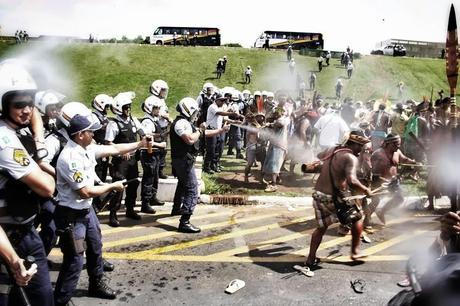By Dominguinhos / The Independent
This week I’m joining thousands of other Quilombola and indigenous people on the streets of Belém, a city in the northern Pará State, to take part in a three-day protest to highlight the Brazilian government’s unnecessarily long bureaucratic delays in granting Quilombola communities legal title to their own land.
This is an ongoing problem that often leaves communities like mine without formal title to the land. That, in turn, leaves the door open to big business to undertake potentially environmentally damaging exploratory work, with potentially devastating consequences for our way of life.
This is exactly what is happening now here in Oriximiná. Bauxite producing mining company Mineraçao Rio do Norte (MRN) – its key shareholders include FTSE 100-listed BHP Billiton and Rio Tinto Alcan, which between them own nearly a quarter of the company – has recently started exploratory work on the land where we live.
Although we’ve applied for the titles to this land, we continue to struggle for the right to these titles, and we believe the Quilombola, one of the most marginalised groups in Brazil which trace their origins back to escaped African slaves, have been disregarded by the government in favour of big businesses.
In 1988, a constitutional change in Brazil allowed Quilombola communities like mine to apply for collective ownership of their lands for the first time in centuries. We, in the Abuí community, were one of the first to take this opportunity. With the support of Christian Aid’s local partner organisation Pro Indian Commission-São Paulo (CPI), who’ve been supporting us in our battle to gain the land titles, we now jointly own the area of Alto Trombetas with four other villages.
But not all communities have been so lucky, with many left in this slow administrative queue as they struggle for the title to land that is rightfully theirs. In fact, just an estimated six per cent have such titles, indicating that the land rights set out in the Brazilian Constitution are still not being honoured.
I was amazed when I heard miners were on our lands once more. Different miners have visited our lands before, but they eventually went and left us in peace. We thought the threats to us were over.
On 16th September, our communities – who live in simple riverbank wooden homes and make a small income from selling forest products such as Brazil nuts, açai berries and cassava flour – started protesting against the company which is encroaching on the land where we have lived for generations and exploring the mining potential of our precious Amazonian habitat.
We’ve seen it happen to a neighbouring community – they’ve been left with just a small piece of land and are now surrounded by mining activities that have destroyed the forest all around. We don’t want that to happen to anyone else, so we must do something about it.
For us, it’s very important to have this opportunity to talk about what’s happening. We believe the whole world should know what’s really happening to poor people like us.
Gaining land rights is especially important for Quilombola communities, particularly in light of our history. It means we can protect the rainforest we rely on for food, homes and survival. In fact, studies have shown that where collective land titles are held by Quilombola and indigenous communities, deforestation stands at just one per cent, as opposed to 20 per cent in the rest of the Amazon.
What is particularly upsetting is that we’ve lived here for hundreds of years and would never dream of moving onto someone else’s land. This is what these companies are doing and we’re disappointed by the lack of respect shown they’ve shown us.

The work they are currently undertaking, such as building access roads deep into the Amazon, is not only threatening our habitat, it will deeply affect the environment in many ways – deforestation, loss of animals and plants. These activities involve the occupation of an area much larger than the mine location itself, because the company will also take land for roads, storage yards and camps.
Our message to the Brazilian government is: ‘no title, no mining’. Why should these companies have the right to conduct geological investigations in our territories, if quilombola communities continue to wait to be granted land titles that are rightfully ours?
It’s sad to see that my government seems to prioritise big business instead of poor people. It’s an open door for big business to exploit our natural resources – and it’s a constant threat to our lives.

